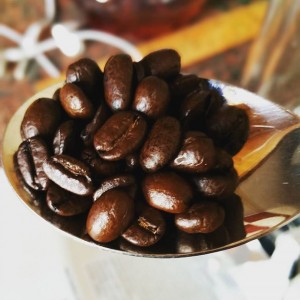Kenya single bean producing area introduces how to brew Kenyan single bean.

For professional baristas, please follow the coffee workshop (Wechat official account cafe_style)
Baked beans
The use of deep baking emphasizes the deep taste, changeable layers and full mellowness of Kenya, properly suppresses the acidity of shallow baked fruits and creates a balanced sour and sweet taste, similar to the introverted acidity of grapefruit and blackcurrant, and the crisp sweetness of Fuji red apples.
The bean body is perfectly expanded, full and thick.
Coffee evaluation
The dry aroma is rich and rich, reminiscent of ripe fruit with a sweet smell like sugar. The wet aroma is easily associated with grapefruit, tangerine and butterscotch. When hot, the entrance is sour and sweet, the acidity is introverted and powerful, the sweetness is like the crisp of Fuji red apple, full of fruit style, rich and pure, deep baking makes sweet and sour balanced, and the sweetness is fresh with obvious caramel sweetness. After the temperature drops slightly, the characteristic of high alcohol is very obvious, the coffee liquid flows in the mouth, silky smooth touch, full, caramel style is obvious, even if the temperature continues to drop, the sweetness of coffee is always outstanding, even at room temperature. Sweet and pure like the juice of this season's beautiful Fuji red apple. The aftertaste is clean and stays in the mouth for a long time. In the process of drinking, it is always surrounded by strong aromas of sweet and sour fruits and caramel.
Kenya Kenya
Population: 44353000
The largest number of coffee beans are produced in central Kenya, and the best quality coffee beans also come from the central region. At present, western Kenya is also interested in growing coffee, such as Kisi Kisii, trans-Enzoya Trans-Nzoia, Keiba Keiyo, Malagua Marakwetfm region.
KIAMBU
Most of the central areas are big landlords. However, with the expansion of urbanization, a large number of large landlords find it more profitable to sell their land for urban development than to become landlords. The coffee beans in this area are named after the place where they are produced, such as Xinka Thinka, Ruilu Ruiru, Limulu Limuru and so on. Many big landlords run multinational enterprises at the same time, so farming focuses on higher yields rather than higher quality. However, there are still a small number of small farmers in this area.
Altitude: 1500-2200m
Harvest: first harvest: October-December, second harvest: June-August
Variety: SL-28, SL-34, Batian
NYERI
At the center of Neri Nyeri is the Kenyan volcano (extinct volcano). The red soil of the volcanic soil produces Kenya's best beans, so agriculture is the most important industry in the region, and coffee beans are one of its main cash crops. Compared with the big landlords, Niri is generally a small farmers' cooperative, harvesting twice a year, and high-quality beans appear in the main harvest period.
Altitude: 1200-2300m
Harvest: first harvest: October-December, second harvest: June-August
Variety: SL-28, SL-34, Ruiru 11, Batian
Kenya AA Nyeri Gatomboya
Basic information of raw beans:
Producer: farmers around the Kato Boya processing Plant (Gatomboya Factory)
Region: Neri County, Central Province of Kenya (Nyeri County/Central Province/Kenya)
Altitude: 1750-1900m
Treatment: full water washing, elevated sun drying
Variety: SL28,SL34,Ruiri 11
Harvest: April-June, October-December
Soil: fertile volcanic soil
one
[new beans listed] SASINI Manor Kenya PB
Area: the farm is located in the highlands of central Kenya
? Sika district, northeast of the capital Nairobi
? The mountains of Aberdale
? Mount Kenya near the Kirinaga district
Name of the manor:
? Sasini Manor
Varieties: Ruiru 11, Arabica and Bourbon
Altitude: 1700 m
Grade: round beans
Treatment: washing treatment, bean grading, defective beans selected by hand.
Harvest date: early crops: April to September, main season: October to December
Cup test: clean, bright acidity, body mellow, honey and light citrus flavor, peanut taffy flavor. Very sweet, round, with outstanding fruit flavor.
Kenya's climatic and geographical conditions provide unique conditions for the growth of high-quality coffee beans, which are located in eastern Africa, the equator runs through the middle, and the East African Rift Valley runs through the north and south. It is bordered by Somalia to the east, Tanzania to the south, Uganda to the west, Ethiopia and Sudan to the north, and the Indian Ocean to the southeast. The coastline is 536 km long. There are many plateaus in the territory, with an average elevation of 1500 meters. The central peak of Kirinaga (Mount Kenya) is 5199 meters above sea level and the top of the mountain is covered with snow, making it the second highest peak in Africa. The whole territory is located in the tropical monsoon area, but affected by its high topography, it is a savanna climate with great seasonal differences in precipitation. The coastal area is hot and humid, and the climate of the plateau is mild. The highest temperature of the year is 22-26 ℃ and the lowest is 10-14 ℃. Kenyan coffee beans are the mainstay of the local industry. Kenyan coffee is mostly grown at an altitude of 1500,000m above sea level and is harvested twice a year. Its main feature is a distinct fruit aroma, the common fruit aroma is citrus. Kenyan coffee has a multi-layered taste and juice acidity, perfect grapefruit and wine flavor, moderate mellow, is the favorite of many people in the coffee industry.
Brief introduction of producing area:
The raw bean comes from the Kato Boya processing plant in Neri and comes from a nearby family farm. About 2023 coffee trees are planted on half an acre (about 250 square meters) of land. The Kato Boya processing plant is managed by Barichu Farmers Co-operative Society Limited. Neri has always been a classic coffee producing area in Kenya, relying on Mount Kenya, with a favorable environment for coffee growth. Most Kenyan coffee comes from about 65 per cent of small farmers and 35 per cent of large farms.
Cup test keywords: classic Kenyan flavor, rich, high alcohol, caramel, blackcurrant, apple, pure, lingering finish
Classic Kenya style;very complex;a full body;caramel;fruity;black currant;clean;long finish;comfortable sweetness
Evaluation record
Raw bean
Pink, tender and fresh green raw beans, full, thick and round in curve
Important Notice :
前街咖啡 FrontStreet Coffee has moved to new addredd:
FrontStreet Coffee Address: 315,Donghua East Road,GuangZhou
Tel:020 38364473
- Prev

Does Kenya's single bean taste good? the planting and processing of Kenya's single bean
For the exchange of professional baristas, please follow the coffee workshop (Wechat official account cafe_style) Kenya Kenyan population: 44353000 Central Kenya produces the most coffee beans, of which the highest quality coffee beans also come from the central producing areas. At present, western Kenya is also interested in growing coffee, such as Kisi Kisii, Trans-Enzoya Trans-Nzoia, Keiba Keiyo, Mara.
- Next

What are the suggestions of Kenyan bean baking in Kenya bean farm?
For professional baristas, please follow the Coffee Workshop (official Wechat account cafe_style). This raw bean comes from the Kato Boya processing plant in Neri and comes from the surrounding family farm. About 2023 coffee trees have been planted on 0.5 acre (about 250 square meters) of land. The Kato Boya processing plant is managed by Barichu Farmers Co-operative Society Limited
Related
- Does Rose Summer choose Blue, Green or Red? Detailed explanation of Rose Summer Coffee plots and Classification in Panamanian Jade Manor
- What is the difference between the origin, producing area, processing plant, cooperative and manor of coffee beans?
- How fine does the espresso powder fit? how to grind the espresso?
- Sca coffee roasting degree color card coffee roasting degree 8 roasting color values what do you mean?
- The practice of lattes: how to make lattes at home
- Introduction to Indonesian Fine Coffee beans-- Java Coffee producing area of Indonesian Arabica Coffee
- How much will the flavor of light and medium roasted rose summer be expressed? What baking level is rose summer suitable for?
- Introduction to the characteristics of washing, sun-drying or wet-planing coffee commonly used in Mantenin, Indonesia
- Price characteristics of Arabica Coffee Bean Starbucks introduction to Manning Coffee Bean Taste producing area Variety Manor
- What is the authentic Yega flavor? What are the flavor characteristics of the really excellent Yejasuffi coffee beans?

